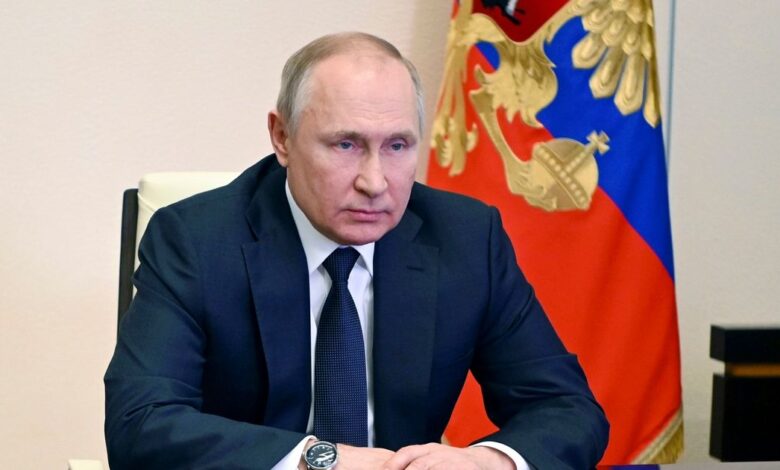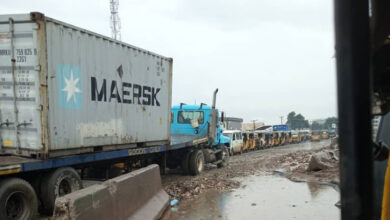Russia Warns of a Nuclear War if The West Defends Ukraine

Moscow’s tightly-controlled state TV has issued a chilling nuclear threat to the West should NATO wade into the bout by sending peacekeepers into Ukraine, saying World War III may just be lurking around the corner.
Barring any resolution of the alliance leaders at the G-7 summit afoot in Brussels, the Kremlin issues stern warning against deploying any troops into Ukraine on the pretext of maintaining peace.
These frightening pitfalls unfold four weeks into Russia’s invasion, as Putin’s forces continue to bombard countless Ukrainian cities with air raids, whilst Kyiv’s resistance holds fast.
A TV presenter Vyacheslav Nikonov claimed that Russian truck drivers stuck on the border had spotted “an accumulation of American and Polish troops”.
“As for me, Poland strives not just to fulfil a peacekeeping mission, but to stake out the territories which they consider belonging to them historically,” Russian television host and political commentator, Olga Vladimirovna Skabeyeva noted.
“They should understand that this will represent a direct clash between the armed forces of Russia and NATO, and how this collision will end is probably not worth explaining… this is called World War Three,” she added.
Despite threats of ratcheting up the warfare, Russia’s invasion continues to stall and stutter in the face of logistical and morale issues and huge Ukrainian resistance, albeit early reports suggested that the Kremlin intended to take Ukraine in a ‘lightning invasion’ lasting days.
Russia’s threats were echoed on other Kremlin-controlled shows. On Channel 1, Colonel Yury Knutov repeated the same claims.
He said, “If there are any sane people left in NATO, they will not approve [a peacekeeping] operation [in Ukraine]. Why? Because [a collective] NATO decision will mean a de facto declaration of war on Russia… this would be a casus belli – meaning war between Russia and NATO. To win this war, whether we like it or not, we will have to use tactical nuclear weapons in the theatre of operations”.
”This will then entail the use of powerful strategic nuclear weapons… which means universal nuclear war,” he inferred.
Putin’s spokesman Dmitry Peskov said that Russia would only use nuclear weapons in the event of an “existential threat”, but also warned deploying Western peacekeepers to Ukraine would be “very rash and extremely dangerous”.
He said, “A special military operation is underway, and any possible contact between our military personnel and NATO military personnel could lead to quite understandable consequences that would be difficult to put right.”
Russia’s state TV mouthpiece also warned the same outcome would come about if Poland acted independently, and not under the NATO umbrella.
Throughout its unsuccessful invasion of Ukraine, Russia has repeatedly made threats towards the West about intervention.
On top of the invasion not going as planned, Western media reports suggest that Russia had been begging China for military equipment and financial support to help it get around sanctions since it all began on February 24.
China, along with India, is one of the few powers yet to denounce Putin’s bloody invasion of Ukraine.
The butcher of Chechnya, veteran Colonel-General of the Russian Armed Forces, Vladimir Shamanov, told Channel 1 that Putin should secure Ukraine’s Western border with Poland.
The MP and recipient of Russia’s highest honour, the Hero of Russia, said, “The time has come for our leaders to say very clearly – these are the borders and don’t you Poles dare to poke in here even 10 metres. You’ll be hit immediately with the whole might of our Kalibr [cruise missiles] and with all the might of artillery and aviation”.
Poland on Wednesday had expelled 45 Russian “spies” posing as diplomats but NTV channelowned by Gazprom-Media said this was part of concerted action against Moscow, which it wanted out of the G-20.
“Warsaw is sending out Russian diplomats, and is calling for Russia’s replacement in G-20, as well as to bringing peacekeepers into Ukraine,” said the channel, whilst, in addition, ”increasing its army twofold, strengthening its border grouping. Perhaps Poland wants to get back territories it lost some time ago?”
– Cracks in the Kremlin –
However, as Russian state TV makes bold threats, there are reports of possible cracks between Putin and his top generals, as there may be no love lost within the Kremlin circles harbingering a possible putsch with extreme political volatility.
Defence Minister Sergei Shoigu has not been seen for 13 days amid claims he has ‘heart problems’ just as reports suggest Putin held him responsible for the invasion’s failure so far.
Alongside this, Anatoly Chubais, the man who gave Putin his first job in the Kremlin, resigned and fled Russia in dramatic fashion, reportedly with the intention of never returning, over his opposition to the war.
The US “Doomsday Plane” has been spotted flying over Europe, as tensions continue to rise with Russia.
The Boeing 747 E4-B aka Nightwatch aircraft can remain in the air for days, and even withstand the electromagnetic pulse from a nuclear blast.
Washington has maintained a fleet of these super-luxurious £150m planes since the Cold War, with the intent of using them as mobile bases if a war did turn nuclear.
The plane, officially known as the ‘Flying Pentagon’ to house senior military personnel and the defence secretary, was spotted taking off from the US on Wednesday night asides from the convoy shuttling the president over to Europe.
Recall at the height of the Cold War, when nuclear exchanges seemed like a plausible scenario, both the US and the Soviet Union commissioned Doomsday planes, designed to function as flying war rooms, from which the superpowers’ leaders could issue commands in the escalating event of a nuclear war.
Theoretically, the plane is capable of surviving a nuclear attack as well as the stygian effects of electromagnetic pulse, whilst keeping the leaders in touch with other world leaders through satellite communication.
”The E-4B is protected against the effects of electromagnetic pulse and has an electrical system designed to support advanced electronics and a wide variety of communications equipment,” the US Air Force writes on their website, described as ”an advanced satellite communications system provides worldwide communication for senior leaders through the airborne operations centre. Other improvements include nuclear and thermal effects shielding, acoustic control, an improved technical control facility and an upgraded air-conditioning system for cooling electrical components.”



